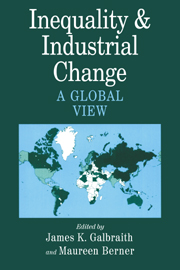Book contents
- Frontmatter
- Contents
- Contributors
- Permissions
- Acknowledgments
- PART I INTRODUCTION TO THEORY AND METHOD
- PART II INEQUALITY, UNEMPLOYMENT, AND INDUSTRIAL CHANGE
- 3 The American Wage Structure: 1920–1947
- 4 Inequality in American Manufacturing Wages, 1920–1998: A Revised Estimate
- 5 Interindustry Wage Structures: New Evidence from the OECD
- 6 Inequality and Unemployment in Europe: The American Cure
- PART III INEQUALITY AND DEVELOPMENT
- PART IV METHODS AND TECHNIQUES
- Data Appendix
- References and Selected Bibliography
- Index
6 - Inequality and Unemployment in Europe: The American Cure
Published online by Cambridge University Press: 05 June 2012
- Frontmatter
- Contents
- Contributors
- Permissions
- Acknowledgments
- PART I INTRODUCTION TO THEORY AND METHOD
- PART II INEQUALITY, UNEMPLOYMENT, AND INDUSTRIAL CHANGE
- 3 The American Wage Structure: 1920–1947
- 4 Inequality in American Manufacturing Wages, 1920–1998: A Revised Estimate
- 5 Interindustry Wage Structures: New Evidence from the OECD
- 6 Inequality and Unemployment in Europe: The American Cure
- PART III INEQUALITY AND DEVELOPMENT
- PART IV METHODS AND TECHNIQUES
- Data Appendix
- References and Selected Bibliography
- Index
Summary
There is a common view that unemployment in Europe is attributable to rigid wage structures, high minimum wages, and generous social welfare systems. In fact, countries that possess the low inequality such systems produce tend to experience less unemployment than those that do not. We show that inequality and unemployment are related positively across the European continent, within countries, between countries, and through time. Large intercountry inequalities across Europe also appear to aggravate the continental unemployment problem, and we find evidence that when these inequalities are taken into account, overall earnings inequality is higher in Europe than in the United States. We therefore suggest that the key to reducing unemployment in Europe lies in measures that reduce, not increase, inequalities in the structure of pay – and that do so at the continental level. This is a long-standing and often overlooked characteristic of social welfare policy in the United States.
Introduction
What is the relationship between inequality and unemployment? This question is perhaps the most important issue in the political economy of Europe, and it has relevance for other regions with developing transnational ties, including the United States and the North American region.
One widely held view is that high unemployment rates in Europe are due to that continent's generous social welfare systems and “rigid” wage structures, or, in other words, to the equality that is the characteristic goal of social democracy.
- Type
- Chapter
- Information
- Inequality and Industrial ChangeA Global View, pp. 109 - 136Publisher: Cambridge University PressPrint publication year: 2001



